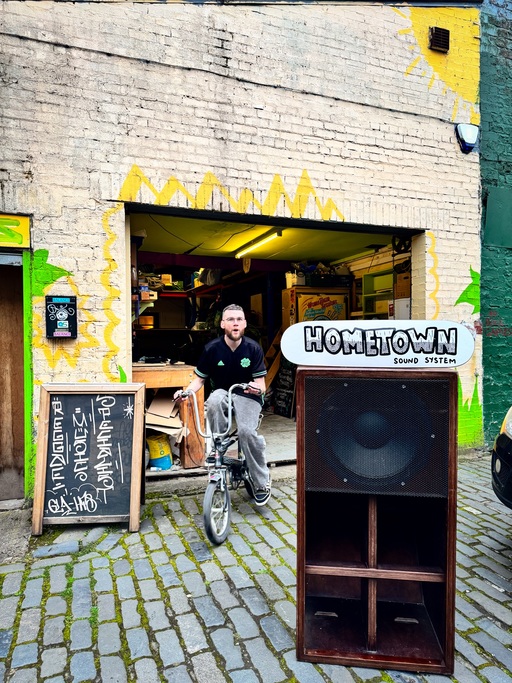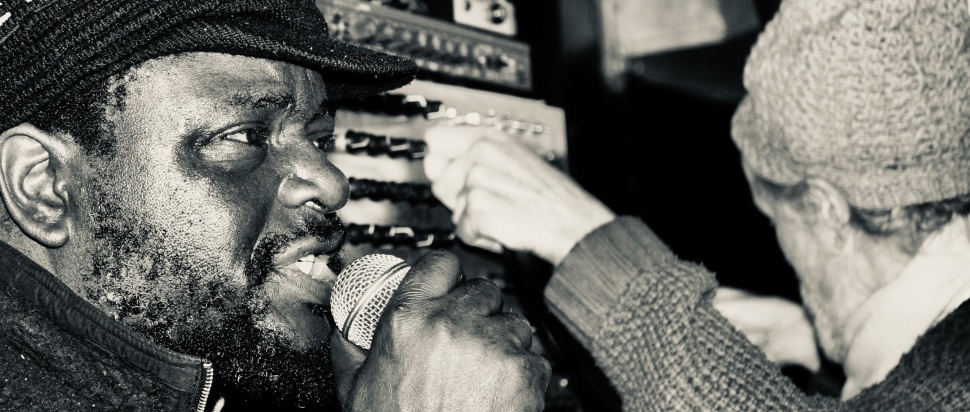Messenger & Hometown on Scotland's Sound System scene
We sit down with some of the country’s unsung sound system pioneers, exploring the trails they’ve blazed and continue to navigate in amplifying new sounds
Sound system culture has long had a home in Scotland, and is championed locally by a cluster of crews, festivals and club nights. Establishing itself as Scotland’s Original Roots advertiser since 1987, Messenger Sound System, familial at its core, consists of Stevie and his two sons Lawrie and Curtis, alongside Steadfast Sylvatica, MC Ista, MC Afrikan Simba, MC Yah IsReal and Craig the cashier.
Before setting up shop in the capital, Stevie – residing in Dundee – kept a keen eye on opportunities to share his spirit as a young reggae fan. Barely old enough to enter local nightspots, he recalls, “I used to take my records down to play at parks, the art school… anywhere I could really.” In these days, “we only had discotheques… they were pretty dire man. I was like, where's the B-Line?” Following Bob Marley & The Wailers' burst onto the mainstream with Exodus on Island Records, Stevie remembers an upsurge of live bands who would gig university and college circuits, “but in terms of sound systems, they didn’t get north of the border for a few years.” In the early 80s, Papa Swi and the Ital Club ran in an upstairs room in Edinburgh's Playhouse, but – disappointed by the in-house PA that awaited punters – Stevie headed south.
“Back then, in London, reggae was king. It was the starting point for sound systems,” he explains. “Folks from the Caribbean generally weren’t welcome at nightclubs, so partly to carry on Jamaican traditional sound system culture [and equally out of necessity], they built their own.” Gravitating towards the sounds of Jah Shaka and without a place to stay in London, he laughs, “if the dance went on til six in the morning, that was great.” It would leave just enough time to hit Brixton before returning home with fresh records. Still, ever struggling with the sub-par playback systems that awaited in Scotland, he realised that “the best way to get the full package, is to bring the full package.”
By this period, regularly playing out of The Bongo Club, Stevie had lugged Mancunian bass boxes to the Cowgate, acquired an effects unit, and a preamp. “That's the fundamental thing for us. It’s the brain the turntable goes into,” he explains. He's now operating mark four of his custom-built model, designed with assistance from good friend Mostec. For Messenger, “it’s not about the skill of the beat mixing"; Stevie’s crew position boxes around venues, “standing shoulder to shoulder with crowds,” and actively tweaking equalisers for maximum musical effect. “The onus is on the sound," he explains. "You want to hear your rig have the characteristics you enjoy, and make them work in the place,” whether that be the compact cellars of Lost in Leith or the high ceilings of Summerhall.
Stevie rebuilt the system during lockdown with the help of son Lawrie. “I couldn’t have done it without him. It’s the younger generations’ input that helps us move forward.” He beams, “I’m glad they see a need for a sound like us,” reminiscing about early Music House trips to cut Curtis’ productions to acetate dubplates. “It's a special little something. It’s heavy, cold, and smells a certain way in the sleeve.” You’ll need to attend a future session, such as Portobello’s Grand Reggae Ball (13 Apr), to experience the sounds of their studio on the system they were informed by and engineered for. “There's nothing else like it," he says, "that's why I’m still doing it.”

James Whelan. Credit: Hometown.
It’s clear that there remains more to be done to bring sound system culture to the public. “I’m very much for the idea of bringing people together for free. Look at all the parks we’ve got, and yet they’re not very well utilised. The grassroots people ain’t getting represented,” Stevie adds. “We want to see some of the decision-makers realise the cohesive value that music events put on by locals for their communities can have.”
Rub a Dub Rocker’s Hometown Promotion Sound System – one feature of James Whelan’s multifaceted Raggamuffin outlet – forecasts hope for the future of bass music under Glasgow’s techno mafia monopoly. Alienated at O2 ABC nights as a teen, in 2007 Whelan heard whispers of Record Playerz electro offerings and Boom Monk Ben’s Mixed Bizness at the Art School. He recalls the ferocious vibrations of Mungo’s Hi Fi that shook the venue's shutters: “I felt like I’d found something. I remember standing in front of the kick bins all night, putting my head in them.”
He soon became a regular at Blackfriar's Argonaut Sounds nights, and in between flyering for Optimo would scout Lee Perry CDs to spin at Chambre 69 (now Room 2) in promotional collaboration with Mungo’s. He “ended up serving an apprenticeship with them in 2012, touring sound system sessions across Europe,” before returning to The Berkeley Suite, often accompanied by vocalists circulating Scotch Bonnet’s studio, for Walk n Skank. “That was a really important night for the development of bass music in Glasgow,” he says – pointing to the bins of 527 situated in his studio. “I don’t think they would exist without it.” Eventually passing the baton to Tom Spirals of An Dannsa Dub and BBC Introducing Scotland’s Vixen Sound for the party’s final few years, Whelan left to form Hometown. “It’s in the name right… Hometown Hi-Fi” – an homage to dub legend King Tubby, and also representative of the duty he feels towards Glasgow. “It’s about being here in the community, sharing our resources.”
Raggamuffin Records sprouted out of Cleveland Lane during lockdown as a remedial reaction for gig-redundant system owners. “It was a lifeline for us, a lot of our customers, and the local community round here,” Whelan explains. It's hard to pin down to a core crew – notable names include Welshy, Sippa Seb, Jamie, Mick and EV, in addition to T-O-D and izit? of SOUND (a fresh endeavour, operating out of Stereo).
“There’s a real lack of bass music nights with a sound system in Scotland,” says Whelan. “I don’t believe that’s negligence; the economy of nightlife is difficult at the moment.” By sharing new styles within an environment typical to a traditional reggae dance, he hopes to provide “a route into sound system culture for a younger demographic.” He remembers Fortified Sessions at The Art School, “where people heard dubstep off a sound system, and months later would be bopping their head to roots at a reggae dance as they start digging deeper into the culture.”
Following a momentous full circle link up at The Old Fruitmarket with Mungo’s Hi Fi last month, Hometown head into summer with their first Kelburn takeover before sailing the stacks to the Isle of Arran alongside Messenger in July. “If people are genuinely interested in sound system culture and want to come hang out and give us a hand, I’m pretty sure we can teach them things they wouldn’t learn anywhere else.” Whelan enthuses. “It’s a mission, not a competition.”
Messenger Sound System play the Grand Reggae Ball, Portobello Town Hall, 13 Apr; Messenger play monthly at Bongo Club, Edinburgh
Hometown host SOUND at Stereo, Glasgow, 4 May – tickets via RA
